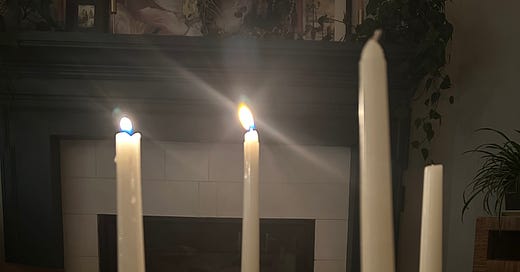I’m writing to you at this very moment on the second Sunday of Advent, in a pretty peaceful state. Today began with “the good bagels” which is what we call it when we get real bagels from a bagel shop instead of the ones at a grocery store, and then grocery shopping (for everything but bagels) at Trader Joe’s, followed by Christmas gift wrapping and a whole lot of resting.
It’s the second week of Advent, and this week we light the “Bethlehem candle” representing peace. Light your first candle, for hope, and your second, for peace, and then read along.
In preparation for today’s share, I asked Google “What is the opposite of peace.” Answers ranged from “conflict,” “disharmony,” and “war” to “anxiety,” “strife,” and “irritation.”
To me, a summation could be: “Suffering.” Suffering is the opposite of peace. And when I think of it this way, peace feels so much more accessible. We all know what peace has felt like and we know suffering too. I’m beginning to think perhaps they aren’t to be uncoupled because their contrasts lend to each other just like darkness and hope.
Nobody wants to suffer. But it’s hard for us to let go of that concept because it gives meaning to our inner turmoil, it gives us a story, a name, and an explanation for our experience. “I am in great suffering!” we might scream, to alert our people and the world, that we are not well. “Suffering,” perhaps, gives us a name for this journey we believe we are on, the final destination being peace.
But what if peace is no destination, and it is in fact a sacred practice? The practice of being human, yet so very delicately but securely attached to the Divine. What if peace is observing our pain in full volume, and meeting it with “yes, and.”
Yes, this is a pain-filled dark night of the soul, and I will choose peace, because that is the experience I long to have, despite my circumstances.
Now, don’t worry if you’re thinking “Okay, but how do I choose peace?” I Googled that for you too. Google said all the things you’d expect: Accept what you cannot change, practice mindfulness, keep a journal, get out into nature…
But I also discovered the idea that to choose peace, one must practice forgiveness. Forgiveness can feel cliché, but sitting with it reveals its truth. Without forgiving ourselves and others, peace struggles to take root. But I sat with it, and it’s true. I think for any choice of peace to be made, there has to be some reckoning with the grudges we’ve been holding. The suffering we’ve been clinging onto, and the wounds we’ve kept our fists so tight around. And I’m not only talking about other people, I’m talking about us, and the self-forgiveness that must exist.
We cannot transform the chaos around us while we remain at war within.
There is a distinct rhythm here. Nobody wants to suffer, so we brace. We become hard, shelled to the world, and then our sharp edges bump up against each other, and we get hurt further, and grudges dig deeper, and we find ourselves in this suffering, scuffed knuckles, bruised skin, and tear-filled eyes. And then peace enters if we choose it. And peace says “Why not come in for a glass of water and to sit for a minute?” Peace says “I know you’re angry, let me wipe your forehead with a cool rag.” Peace offers the medicine: “I wonder if he was as scared as you were when you both thought you’d lost each other.” Peace is not the outcome of compassion and calm perspective, it is the birthplace.
I love this poem found in “The Wonder of Small Things: Poems of Peace and Renewal” by James Crews
Nothing Wants to Suffer
by Danusha Lameris after Linda Hogan
Nothing wants to suffer. Not the wind
as it scrapes itself against the cliff. Not the cliff
being eaten, slowly, by the sea. The earth does not want
to suffer the rough tread of those who do not notice it.
The trees do not want to suffer the axe, nor see
their sisters felled by root rot, mildew, rust.
The coyote in its den. The puma stalking its prey.
These, too, want ease and a tender animal in the mouth
to take their hunger. An offering, one hopes,
made quickly, and without much suffering.
The chair mourns an angry sitter. The lamp, a scalded moth.
A table, the weight of years of argument.
We know this, though we forget.
Not the shark nor the tiger, fanged as they are.
Nor the worm, content in its windowless world
of soil and stone. Not the stone, resting in its riverbed.
The riverbed, gazing up at the stars.
Least of all, the stars, ensconced in their canopy,
looking down at all of us— their offspring—
scattered so far beyond reach.
So as you move about this week, my invitation is to gently ask yourself where in your life are you choosing peace? What suffering could you loosen your grip on to let peace begin to mend the wound? And most bravely, what might you need to release or unlearn to fully embrace peace?
I’ll be here next week with a truly splendid week of Advent, while we explore Joy.





